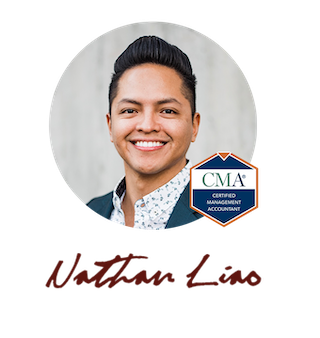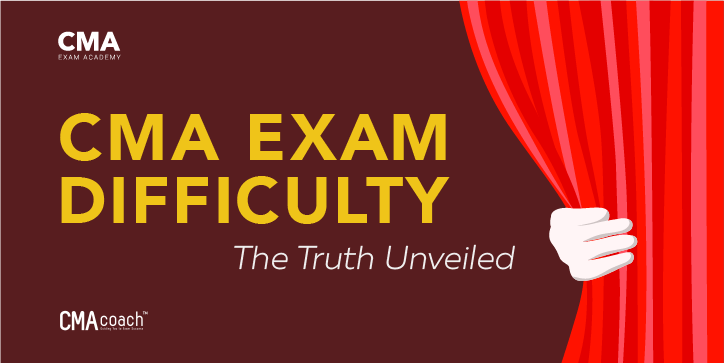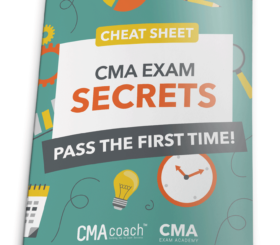Low pass rates, dense material, and a challenging exam structure can make even the most prepared candidates feel uncertain when it comes time to take the CMA exam. But most candidates struggle not because the exam is impossible, but because they don’t fully understand exactly why it’s challenging or how to approach it with a clear plan.
But I have good news for you: once you know what makes the CMA exam difficult — and what to do about it — you can approach your study plan with far more confidence.
Originally published in 2020, this article was updated and republished on December 1st, 2025.
How Hard Is the CMA Exam?
Pass rates sit at about 50% for both Parts One and Two, meaning most candidates don’t pass on their first attempt. Bluntly, the CMA exam is tough.
But understanding why it’s challenging and preparing intentionally can help you close the gap and work toward a passing grade.
How Long Does It Take to Study to Pass the CMA Exam?
To pass the CMA exam, you’ll need to dedicate a bare minimum of 90 hours to studying beforehand. However, we’d recommend shooting for closer to 300 hours to raise your chances of doing well on the exam.
You can space out your study schedule over a six to nine month period. The best CMA review courses will ensure you cover and review all the material.
CMA Exam Prerequisites
The first step in getting your CMA certificate is to earn a bachelor’s degree. What’s interesting about this is that the Certified Management Accountant requirements don’t specify what kind of degree you need to have.
Unlike other career niches where you are required to have an applicable degree, any bachelor’s degree will qualify you to take the CMA exam. That is to say, you could have a bachelor’s degree in Philosophy and that qualifies you for the CMA exam.
In my opinion, this puts you at somewhat of a disadvantage because you will not be familiar with any of the study materials or content prior to preparing for the exam.
While there is an experience requirement that candidates must fulfill — two continuous years in an applicable field of management accounting — I still think the degree prerequisite adds to the low passing rates.
CMA Exam Structure
This exam is made up of two different parts. As I mentioned above, the passing rate for both Parts One and Two is 50%.
Each part of the exam contains 100 multiple-choice questions and an essay section. The essay section consists of two scenarios with anywhere from two to seven questions that must be answered within it. Candidates have three hours to complete the MCQ section and one hour to complete the essays.
The exam is taken at one of the many global Prometric centers and is computer-based. It has been my experience that many candidates get jammed up on how to study for the CMA exam and don’t use the right tools to prepare; i.e. the right review course.
CMA Exam Content
In terms of content, each Part of the exam covers quite a bit of information. Part One is all about Financial Planning, Performance, and Analytics. This requires understanding external financial reporting decisions, planning, budgeting and forecasting, performance management, cost management, internal controls, and analytics.
Part Two consists of Strategic Financial Management, which covers the topics of financial statement analysis, corporate finance, decision analysis, risk management, investment decisions, and professional ethics.
Each of these topics is broken down even further into more detailed sub-sections, which adds up to a lot of material to work through. So if you were wondering how to pass the CMA exam, be sure to use a study planner and strategically plan out all the material!
The sheer volume of information covered in each part of the exam is one of the reasons that getting a CMA exam passing score is so difficult. For this reason, I highly recommend using a review course so you can focus your study efforts on the information you don’t understand that well rather than wasting your time on content you comprehend.
Skills the CMA Exam Tests You On
Due to the fact that the role of a certified management accountant is so specialized, it’s necessary that the exam tests candidates’ various cognitive skills to ensure they really know the material.
The ICMA (the governing body responsible for scoring the exams) tests the following skills:
-
- Knowledge – ability to identify, define, and list learned materials and facts
- Comprehension – ability to grasp and understand the content
- Application – ability to demonstrate how knowledge is used in real situations
- Analysis – ability to break down components, identify, and interpret relationships between causal relationships, etc
- Synthesis – ability to use knowledge learned from analysis to formulate new procedures or operations
- Evaluation – ability to criticize material, justify its accuracy, and form conclusions
Your ability to demonstrate each of these cognitive skills, especially during the essay portion of the exam, is critical to success.
CMA vs CPA Exam Difficulty
I get a lot of questions about whether or not the CMA or CPA is the right way to go. There are similarities between the two designations (a likeness for numbers and accounting), but there are several differences between the CMA vs CPA exams, respectively.
Unlike the CMA exam that covers all the aforementioned topics in just two exam parts, the CPA exam is broken down into four parts. By splitting up topics into smaller chunks, it makes it easier for CPA candidates to focus their study efforts on key material without overwhelming themselves with a ton of information.
This could account for the slightly higher CPA exam pass rates. The overall pass rate for CPAs is nearly 50%.
The scope of material covered for financial management varies by designation, and your personal interest in the material can have an effect on your success. For example, if you are enjoying the CMA content you will be more apt to stick to a study program and, of course, more likely to retain the information. On the other hand, if you find public accounting topics more exciting, then the CPA exam may be right for you.
How to Pass the CMA Exam with Ease
It’s true, the general format and volume of material covered in each part of the CMA exam can make it difficult, but there are ways around this.
For starters, understanding the multiple-choice section of the exam and what is expected from you during the essay section of the exam process can be incredibly beneficial. The more familiar you become with the exam structure, the more likely you are to succeed.
In addition to that, choosing a CMA review course that taps into your personal learning style while ensuring you study the right amount of hours per week can increase your odds, too.
Also, learning to avoid procrastination and surrounding yourself with supportive friends and family can make a world of difference.
When it comes down to it all, the CMA exam is constantly changing. Developed by the Institute of Management Accounts in 1972, they are continuously introducing new exam questions and evaluating the effectiveness so candidates are being tested fairly. Just make sure to put in the study time, use a high-quality CMA review course, and believe in yourself. You can do this!
And if you want more structure, accountability, and support, the CMA Exam 16-Week Accelerator course provides you with the same strategies I’ve shared with more than 80,000 accounting and finance professionals to help them study smarter and feel ready heading into exam day. But the Accelerator is packaged in the most efficient way possible to give you the best exam results.
Worried about passing or have any other questions to ask? Drop them in the comment section below.
More from Nathan:
- CMA Exam Passing Score: How is the Exam Graded?
- How to Study for the CMA Exam
- Why You Need Live Coaching Calls to Stop Over Analyzing Your CMA Study Material

Hi, I’m Nathan Liao (aka the CMA Coach)! For the last 10 years, over 82,000 accounting and finance pros came knocking at my door seeking guidance and help. If you’re also aiming to conquer the CMA exam on your very first try—without wasting away time or money—you’ve found your ultimate guide. Dive in deeper to discover more about me and the dedicated team that powers CMA Exam Academy. Click here and let’s embark on this journey together!



38 Comments on “How Hard is the CMA Exam? Understanding CMA Exam Difficulty”
Hi,
1. how much percentage scope for CMA ?
2. what is the level of CMA when compare to CA \ ACCA \CPA etc ?
3. a person who cleared CMA what that person should do ?
4. what is purpose of CMA ?
Hi Fathima,
Starting the CMA journey can be a little confusing. I wrote an easy-to-read article to help you. Here’s the link: https://cmaexamacademy.com/how-to-become-a-cma-in-just-over-6-months/ref/nathan/
If you have any follow up questions, don’t hesitate to hit reply.
What is the % of MCQs (only) passing candidates?
And how many of them failed to pass the CMA exam after essays ?
Hi Sir,
I want to ask can sit in exam of cma in same testing window as i failed my exam and want to give another time beacuse i heard bad news few hours before my exam and couldnt be able to focus.
Hi Syed,
Unfortunately, candidates can’t retake an exam within the same exam window.
You’ll need to reschedule it for the next exam window.
For more info please visit: What to Do If You Fail the CMA Exam
I have a question. When I took the CPA exam, they had to be taken within a certain window or the passing tests began to expire. Does this test work the same way?
Hi Laura,
According to the 2021 CMA Handbook: “Candidates must complete the CMA program within three years from the date of entry into the program. If both exam parts are not successfully completed within three years of entering the certification program, any passed part will expire, and the CMA entrance fee will have to be repaid.”
If you have any questions left please don’t hesitate to ask
Hii sir, which time is best to write cma exams?
Sir
Please guide to complete foundation exam of CMA
Hi Saroj,
Are you referring to the Indian CMA exam? I ask because there isn’t a foundation level in the US CMA exam. You can learn more about it here.
Hello sir ,
Will you just tell me how many hours per day we need to study ?I’m the student of TY BCOM.I am really tensed about my CMA exams which I’m giving in may 2020.and going for Part 2 first .so please suggest me as per that ?!thank you
Hi Sushma,
If you self-study, you’ll need to devote around 20 hrs/week to your exam prep.
With a coaching course, you will slash that time in half.
Thanks,
Nathan
I asked about the level of exam in comparison to non commerce background students.
Who hard it would be for us if we want to track CMA and what are the majors which we have to pay attention for?
Hi
What about non commerce background student?
If they want to do CMA and they haven’t any accountancy background is it too tough for them to crack it?
What are the measure instructions from your side for them to do, and what are those things which they have to put focus more.
Hi Shashank,
For students with no accounting background, we’ve introduced a new ebook – Fundamentals of Accounting. We offer it as part of our coaching course.
It’s great for learning the basic accounting concepts before tackling the more complex CMA subject matter.
Let me know if you have any other questions.
Thanks,
Nathan
Hi
In part 2 which section is more difficult
Hi Adnan,
It really depends on each candidate’s education and work experience background 🙂
You can review the topics tested on Part 2 exam here. The ones you’re less familiar with may feel a bit more challenging as you study for the exam.
Hi Nathan,
The question is, can I attempt the first group of inter on january-february window and do second group on september-october window
Hi Jyothiss,
Are you taking the Indian CMA? There’s no inter level in the US CMA.
Pingback: CMA Part 1 Demystified: Your Definitive Guide
Pingback: Best CMA Review Course Side-by-Side Comparison
Pingback: Understanding the CMA Exam Passing Score
Hi, is it possible or advisable to take both parts in one Exam window?
Or better one exam per exam window?
Timo
Hi Timo,
Great question!
I recommend taking one exam per window if possible.
Since there’s so much material to learn and memorize for the exam, it’s best to focus on one part per window to not overwhelm yourself and to increase your chances of passing on your first attempt.
If you have any other questions, don’t hesitate to hit reply.
Thanks,
Nathan
i dont understand per windowns means?
There are three periods (exam windows) in a year during which you can sit for the CMA Exam. They are the following:
– January-February
– May-June
– September-October
The CMA Exam consists of two parts. You can take them both during the same exam window, or in different exam windows.
In order to not get overwhelmed with too much material, I advise my students to take only one exam part in an exam window, and then take the other exam part in the next windows.
I hope this answers your question, Chirag 🙂
I have just received my CMA part 1 result and unfortunately I couldn’t pass it. I had prepared
using Gliem material for the exams. I want to re take the exam can you guide me onhow to pass the exam
Hi Farzana,
I’m sorry to hear you didn’t pass the exam this time. I absolutely can guide on how to prepare for the retake, and I’m confident that if you follow our study plan you’ll pass the exam next time around 🙂
Here’s the link to our flagship course if you’d like to enroll. But if you have any other questions or need anything else, don’t hesitate to hit ‘reply’.
Thank you,
Nathan
Hi Nathen,
I just want to know that which type of work experience in management accounting is required to start CMA?
Can i start CMA with no work experience and get experience along with my CMA?
Hi Chandan,
I have another article on the work experience requirement, check it here:
https://cmaexamacademy.com/cma-certification-requirements/
You absolutely can take the exam first and then fulfill the experience requirement within 7 years of passing the exam.
You’ll then receive your CMA certification as soon as you submit the education and experience qualifications to IMA.
Thanks,
Nathan
Thank you for the information it’s was very helpful.
In order to succeed in CMA exam the most important factor is time . Time management that you implement during the exam . I would like to ask you some tips and tricks on how to effectively utilize the time during exams.
Hi Anmol,
I’m glad to hear you found this article helpful!
I totally agree that effective time management is a critical factor when it comes to exam success.
In my video below I explain how to tackle the most questions in the shortest period of time and thus earn the most points on your exam:
https://www.youtube.com/watch?v=52mlIP9fwVQ
Hit reply if you have any other questions. I’m happy to help!
Nathan
Pingback: CMA Exam Changes in 2020 - CMA Exam Academy
Hello Nathan,
Thanks for your article. It’s very informative. As someone with an educational and professional background in Accounting, the CMA exam would be the ideal qualification for me. Alas, my problems are : (1) The entry fees are pretty high for the CMA . The rate of exchange of my local currency to the USD does not make it any easier and with no payment plans offerred by IMA, this makes it difficult to enter for this exam. (2) The exam is not offerred in my country, so if I register for the CMA, I would have to factor in airfare and accommodation into my budget. This makes me very frustrated as I know I could do very well in the CMA. Tell me what you think.
Hi Nathan
I m an engineering graduate by qualification from India. I am working with India’s Central Bank for past 5 years. Prior to that I was working with an insurance company for one year. What are the prospects for me after doing CMA? Can I expect a job in finance outside India? Please guide me.
Hi Harish,
The CMA will for sure open a world of new career opportunities for you. Because this certification is globally recognized, you’ll have the qualifications to obtain a management accounting job abroad too 🙂
Click here to discover what jobs you can hold as a CMA.
If you have any other questions, please let me know.
Thank you,
Nathan
Hi Nathan,
Thanks for all the helpful info on the CMA exam. I read every article you send out.
I would like to know if I can take the second CMA exam before the first one, as it has a higher pass rate.
Kind regards,
Michael White
Hi Michael,
You are very welcome. To answer your question, yes you can take Part Two before taking Part One. That’s the order in which I took the exams too. Thanks, Nathan